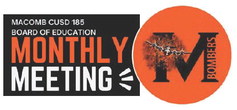MACOMB – Tackling the uncertainty of post-secondary education to provide local labor focus with technical skills for area employers has been a long-running project for the Macomb School District 185, and Superintendent Patrick Twomey spoke about his intended focus during the off-season summer period.
“I am focusing on two things this summer for both me personally, and for the district, one is this whole idea of career technical education, what that’s going to look like in the near future for this district, and the second thing I am focusing on is the escalating cost of special education, and whether or not there are things we can do here locally to help soften what those expenses are,” Twomey said.
School bus transportation for the district was not included in the focus because Twomey felt that the district is “already embedded in that, it’s nothing really new; we’re quite a ways down that path already, and it’s going to happen. We’ve got busses here, we’ve got training here, and we’ve already hired all the employees, so that is not really my focus for this summer.” Momentum for the career and technical education (CTE) project is gathering behind the scenes from local stake holders since the district made the announcement last month to expand the project to “serve a county-wide area with each partner playing a part.”

Several local county-wide stakeholders joining in on planning the career and technical education project include the Western Area Career System (WACS), the City of Macomb, Macomb Area Economic Development Corporation (MAEDCO), other school districts in the area, the Workforce Group, Twomey said, “I think we’ll also bring in some new players to the table like our local manufacturers.”
Anticipating the burgeoning partnership for the planning and establishment of a career and technical education project is gaining traction, Twomey said that he is not in favor of long-term projects happening over night, he is considering an aggressive plan to put finances and site-selection for a new building in place, but a speculative timetable estimated at the earliest, could open five years down the road in the 29-30 school year.
Right now, there is no funding in place, there has not yet been a site selected for a new technical school, and rather than opting out of purchasing the school which the Spoon River College (SPC) might put up for sale, Twomey speculated the district would instead choose to build a new structure stating that many of the schools around the area are 100 years old, and with 100 year old buildings come 100 year old problems making the renovation costs prohibitive.
“We know there are a lot of students who graduate are not going on to four-year institutions, who don’t have the skill set necessary to go out into the workforce and be successful, so that is the group we’re targeting, that’s the group we want to help to get to a place in life where they can be successful,” Twomey said.
The rising cost for students who are enrolled in the district in the special education courses is becoming concerning, Twomey said, reflecting back on the past seven or eight years when annual costs were maybe $500,000 with costs steadily rising year-by-year, “we will be lucky if we don’t hit the $2 million mark.”
Day school and private schools with their rising tuition fees are a factor behind the rising cost of special education, Twomey said.
Students with special education needs have what is called an individualized education plan (IEP) with the least restrictive environment possible. If and when that scenario does not provide a conducive program for special education students, then the Illinois Association of Private Special Education Centers (ISPEC) says that students who are not successful must be enrolled in day schools and private schools, who raise their annual tuition fees because they know that students are mandated by law to attend those schools.
“And, those institutions are charging, in my mind, outlandish tuitions fees, but they know you have no other options at that point. They know you have to send students there. You have some students who are in residential settings. The residential settings that are out there, are few and far between, so they can kind of set their own schedules and they do. Over time, we have more and more students who fall into those categories and expenses are just really skyrocketing,” Twomey said.








